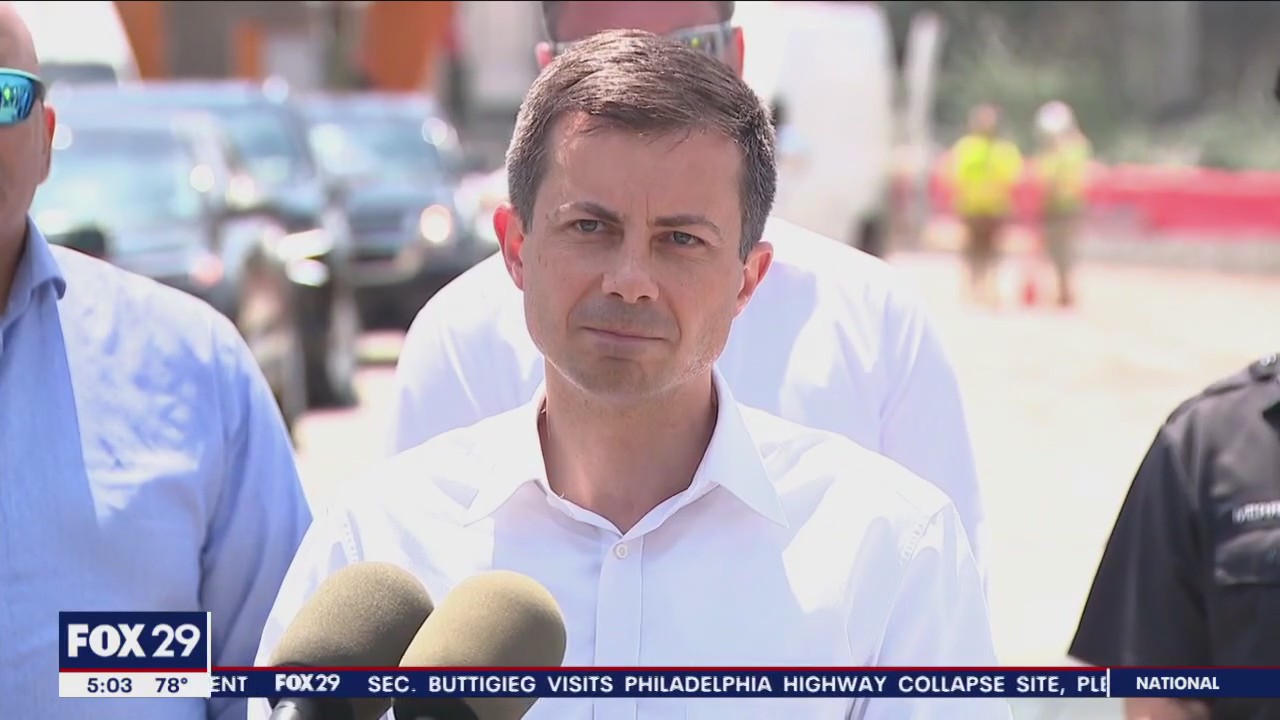I-95 collapse: Transportation Secretary Buttigieg vows federal help to fix damaged interstate

Transportation Sec. Pete Buttigieg tours wreckage of I-95 collapse
U.S. Transportation Secretary Pete Buttigieg toured the wreckage of the I-95 crash and collapse on Tuesday and fielded questions from reporters.
PHILADELPHIA - U.S. Transportation Secretary Pete Buttigieg promised Tuesday to help repair the East Coast’s main north-south highway as quickly as possible and said that the destruction of a section of I-95 will likely raise the cost of consumer goods because truckers must now travel longer routes.
Speaking near the site where an out-of-control tractor-trailer hauling gasoline flipped over on an Interstate 95 off-ramp and caught fire, Buttigieg said he expected that disruptions in trucking routes will put "upward pressure" on shipping costs along the East Coast.
Buttigieg toured the site and then, over the sounds of heavy machinery and demolition, told reporters that "every resource that is needed will be made available" to help Pennsylvania repair the bridge as quickly and safely as possible.
But the collapse is snarling traffic in Philadelphia as the summer travel season starts, upending hundreds of thousands of morning commutes, disrupting countless businesses and forcing trucking companies to find different routes.
Police say the driver perished in the accident, and the Philadelphia medical examiner on Tuesday night identified him as Nathan Moody. He was 53. The resulting fire caused the collapse of the northbound lanes of I-95. The southbound lanes were compromised by the heat from the fire, authorities say.
It could take weeks, at least, to replace the damaged and destroyed section.
Pennsylvania’s transportation secretary, Michael Carroll, said demolition work is continuing around the clock and that his agency will release a replacement plan Wednesday for the roughly 100-foot (30 meter) section of I-95.
Buttigieg said he had not seen any sort of estimate for what sort of cost increases consumers might be facing. But he said the trucking industry is working to make the most of alternative routes. He also suggested that the U.S. Department of Transportation is working with route-selecting software firms such as Google and Waze to optimize their products.
"At the end of the day, there's no substitute for I-95 being up and running in full working condition," Buttigieg said.
Of the 160,000 vehicles a day that travel that section, 8% are trucks and "obviously that is a lot of America’s GDP moving along that road every single day," Buttigieg said.
RELATED COVERAGE
- I-95 collapse: Detours, road closures creating influx of traffic in nearby neighborhoods
- I-95 collapse: Medical examiner confirms identity, cause of death of tanker truck driver
- I-95 collapse: Surveillance video captures tanker crash, fire in Northeast Philadelphia
- I-95 collapse to send ripple effect through East Coast: ‘This is not just a commuter challenge’
Subodha Kumar, a professor of statistics, operations and data science at Temple University's Fox School of Business, said it is impossible to calculate the scale of shipping delays and higher costs caused by detours without analyzing all the alternative trucking routes.
But, Kumar said, the added cost will not be small, and the impact will last for weeks or longer. It will affect commerce to Canada, and create cascading effects throughout the supply chain, he said.
"Any small disruption can multiply exponentially and can make the changes much bigger," he said.
The effect will be immediate on perishable foods, he said.
For now, I-95 will be closed in both directions.
The elevated southbound portion of I-95 will have to be demolished, as well as the northbound side, officials say.
State police officials said the trucking company had contacted them about the accident and was cooperating, although they have declined to identify the company or say whether it was properly licensed for hauling gasoline.
Authorities say the driver was headed northbound on his way to deliver fuel to a convenience store a few miles (kilometers) away when the truck went down a curving off-ramp and out of control, landing on its side and rupturing the tank.
Rebuilding the stretch is likely to drag into July or August.
In California, a similar situation happened with a highway ramp in Oakland. It was replaced in 26 days, Joseph L. Schofer, a retired professor of civil and environmental engineering from Northwestern University, said.
In Atlanta, an elevated portion of Interstate 85 collapsed in a fire, shutting down the heavily traveled route through the heart of the city in March 2017. It took authorities there 43 days to replace the span, Schofer said.


